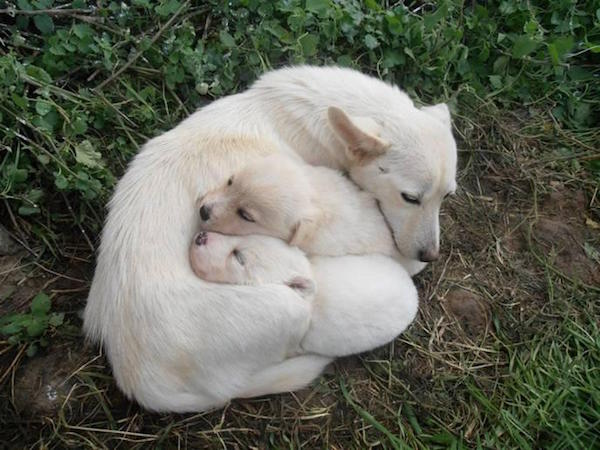
The breed of the mama dog you see here with her puppies is the Alopekis, a primitive dog appearing in Greece during the proto-Hellenic era. They came by their name because of their small, fox-like appearance which is referred to by the ancient Greeks as, “alopecis” (small and fox-like). They were once a mainstay of the Greek street dog population, but what was once a healthy gene pool, became a population of dogs at risk from pesticides, urbanization, indiscriminate breeding, and the absence of anyone who really cared about the breed**, let alone a registering body. It didn’t help that until the 1950s, Greece placed no emphasis on rediscovering its ancient dog breeds.
This has changed – a little. The Alopekis is now being carefully bred by patriotic dog lovers who believe that this is a native Greek breed presently in a precarious state. Consistency has been problematic (**which is why some critics say the dogs are a landrace, and not a breed), but efforts are in motion to rectify this. Volunteers are trying to attract the attention of the Kennel Club of Greece to to the plight of the Alopekis, and the danger of extinction facing it.
As far as we can tell, the Alopekis is one of dogdom’s best kept secrets. By all accounts, these bright and hardy dogs are delightful, playful, sociable, tireless, and eager to please. They make fine companions who can also be watch-dogs, ratters and even natural hunting companions. For everyone who feels compelled to save a shelter dog, consider saving a dog whose entire breed is at risk. There are, sadly, plenty of breeds from which to choose. Just saying.
Image provided by S. Chleiounakis of a male Alopekis in Serres, Greece who got it from the photographer, GFDL, https://commons.wikimedia.org/w/index.php?curid=29785256

The article assumes that the same people adopting a shelter dog will be of the same kind of dedicated individuals that this breed needs to survive. Not that this is exclusive of the possibility, but it implies that they need to be bred, but not how difficult and expensive keeping a limited gene pool is. This article is not well developed and lends itself to dangerous conclusions.
It assumes nothing of the kind, S. What the article assumes is that most readers are not unaware of this particular breed because of its uncommonness, or of how many other breeds are at risk of vanishing. It assumes that many people have never considered that buying a rescue or shelter dog saves one dog – certainly a wonderful thing – but that owning an endangered breed can help save that breed by raising awareness of its breed, and its vulnerability from low numbers. Heritage breeders cannot keep every puppy they breed, and wonderful homes are part of the solution. Add to this that few people are experienced enough to be a breeder, let alone of a limited gene pool, and your assumption that the only way to save a breed is for everyone to breed it is what’s dangerous.
I found your article interesting I had certainly never heard of this breed. However I would have found it helpful had you included how individuals can help..Contact links to breeds that need help and what specifically can be done..Thank you Sue
Thanks for your comment, Sue. The Alopekis is just one breed at risk, and it serves as a “poster child” for all vulnerable breeds. But 600-700 Otterhounds are left in the world, the Skye Terrier and Dandie Dinmont are outnumbered by Panda Bears, and there are more noodles in a package of macaroni than there are Sealyham puppies that got registered one year. The complete list of breeds that are vulnerable in their country of origin can be found here: https://www.thekennelclub.org.uk/getting-a-dog-or-puppy/finding-the-right-dog/vulnerable-native-breeds/. We’ve written about other vulnerable breeds here before (just do a search on our website for “vulnerable” and you’ll get results). Here’s another breed in trouble: https://nationalpurebreddogday.com/a-breed-in-trouble-the-grand-little-sportsmen/
Brilliant post.
Manchester Terriers are a vulnerable breed and are at risk of extinction.
We’ll well aware, Karen, that the wonderful Manchester is also in trouble. We’ll do what we can to keep raising awareness!
I have Skye Terriers in South Africa. It’s been a challenge to breed carefully to establish a gene pool because finding those pet homes is a challenge. Awareness is critical. I have slowly built up a few very passionate pet homes who are well read and pleased to take their beautiful Skyes out and speak to anyone who asks.
Thanks for the comment, Lorraine, it helps confirm a response we had to someone else regarding the same article. Awareness is, as you say, crucially important, and it’s not easy when a breed isn’t well known. We are blessed to have a good Skye Terrier friend who has bred some lovely dogs, and know that it’s a terrific breed for the right family. Continued good fortune to you as you help preserve this breed – and if you have nothing else to do, we’d love to see some pictures!
I would really like to find an alopekis to adopt but can not find them anywhere. Any advice would be appreciated!
Our advice would be to do what we would do, and start with the Internet…..then we’d seek out Greek groups like this one: https://www.meetup.com/topics/greekculture/